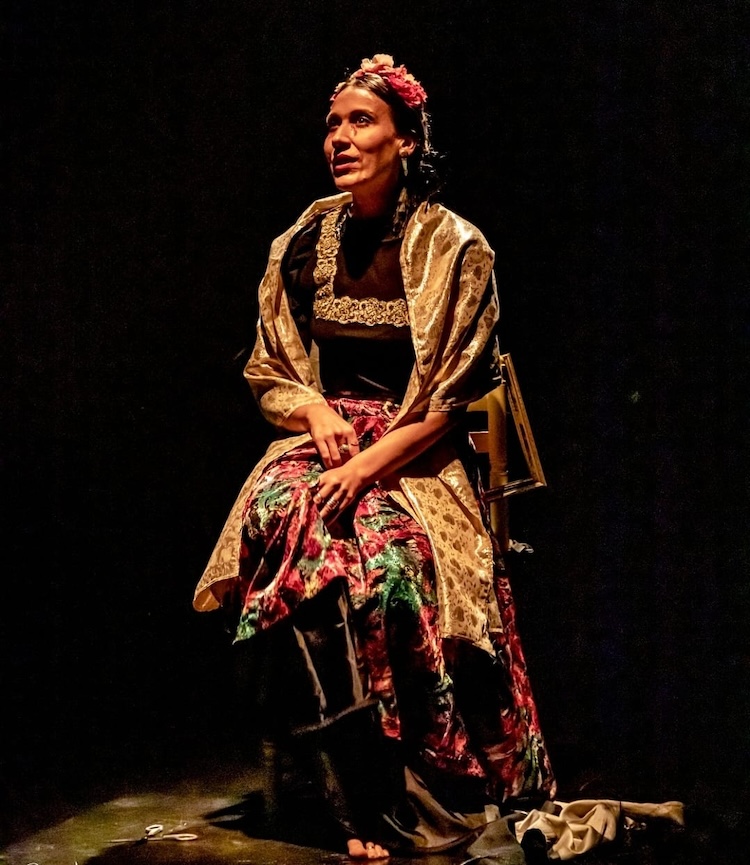After rave reviews on other regional stages, Bénédicte Allard’s solo play about the flamboyant Mexican painter now comes to Théâtre National de Nice.
What springs to mind when you think of Frida Kahlo? Her monobrow? Her eccentricity? Her physical disability? Her tumultuous relationships with Diego Rivera and countless other prominent figures? Or her expressive, vibrant colours with ample use of red and gold?
Whichever your answer, you are right. Frida Kahlo (1907-1954) cannot be defined by one unique hallmark alone – she was a kaleidoscope of qualities, talents, opinions, controversies, reinventions, and surprises. To capture such a dramatic, larger-than-life personality in a theatre play is no small feat, but one that Bénédicte Allard, the young and multitalented artist from Nice, does it to perfection. Her solo “Frida Kahlo, Ma Réalite” plunges you in the Mexican artist’s universe, invites you into her inner sanctum and reflecting with brutal honesty on the good, the bad, and the ugly events of her tumultuous life.
It takes guts to retell such a well-known biography, and Bénédicte Allard does it with brio. She doesn’t play Frida Kahlo, she becomes Frida Kahlo. The rich text, peppered with Spanish words and an occasional Spanish accent, strikes the right note – archival video footage shows that Frida would have used this language, vacillating between dark, reflective, wise, and exuberant. The physical handicap – overemphasized for theatrality – is a constant reminder that Frida spent a lifetime suffering from the consequences of early childhood polio and a horrific accident as a teenager which left her with several broken bones and severe spinal injuries and from which she never recovered.
Bénédicte Allard uses her role smartly to display the enormous range of her talent. She wrote the play, she acts and sings, she appropriates the space in a tremendously physical way, always moving, forever changing the scenography simply by way of lighting and clever use of the sparse décor.
Sometimes the pace becomes a bit too frantic, too great an assault on the senses, and one wishes for the occasional deceleration… but maybe that’s just because we are not used to a life lived as fast and as furiously as Frida’s. She is driven by a sense of “Y no hai Remedio” (“And It Can’t be Helped”) – a theme that first appeared in the Spanish painter Goya’s work, and that runs through the play as a recurring sound element. She is obsessed with one thing only, painting, in her own way. Seemingly catapulted by an inner demon to continuously provoke, confront, and not give a damn about conventions, this woman in a man’s world soldiers on, undeterred, desperately in love with life itself, oozing sex appeal despite her physical impairments, taking lovers or rejecting romantic propositions as she pleased, and undergoing several abortions while longing to be a mother. A contradiction, an affront to social mores? So what? Neither people’s opinions nor hardships matter, she just gives them the middle finger.
But that does not mean Frida did not feel pain, grief, or betrayal. Throughout her life, she painted 150 works, most of them self-portraits capturing her own suffering. In them, she captures reality as she sees it – imperfect but strong.
Themes central to Frida’s life, such as her on-again-off-again marriage to fellow painter Diego Rivera or the love-hate relationship she has with her native Mexico also shine through in the play, gradually helping to shape a more defined image of the unclassable artist.
But at no time does this auto-portrait veer into the realm of caricature, as is sometimes the case with this type of story. Bénédicte Allard, who has a deep academic background in psychology and psychoanalysis, researched Frida’s life from an angle of authenticity, of trying to understand what made the artist tick, and she adds a dimension to the painter’s personality that is often hidden from plain view: sensitivity, vulnerability, reflection, and spirituality.
Those familiar with Niçois theatre will readily discern the signature of Clément Althaus, responsible for the artistic and musical direction – and what an extraordinary oeuvre he creates! Raphaël Maulny’s light universe is as moody and provocative as Frida herself, and Babette Puget’s costumes expertly capture the journey through Frida’s life from the young and sassy to the middle-aged woman who would die an untimely death at age 47.
Created in 2020, the one-woman-show about the “ballerina with the broken spine”, who paints with blood, sweat, tears, and gold, has earned standing ovations wherever it performed. Two shows in Nice at the Théâtre de la Cité in 2022 and 2023 were bring-the-house-down successes. Next, Frida Kahlo will put her easel up at the Théâtre National de Nice on February 1 and 2. And for Frida’s alter ego Bénédicte Allard, this will be a very special home play, as a resident TNN actor in Muriel Mayette-Holtz’s house company.
Frida Kahlo – Ma Réalité
February 1 and 2, 2024
Théâtre National de Nice
Salle des Franciscains
6, place Saint-François
06300 Nice
Book tickets online
Photos courtesy Bénédicte Allard




Leave a Reply